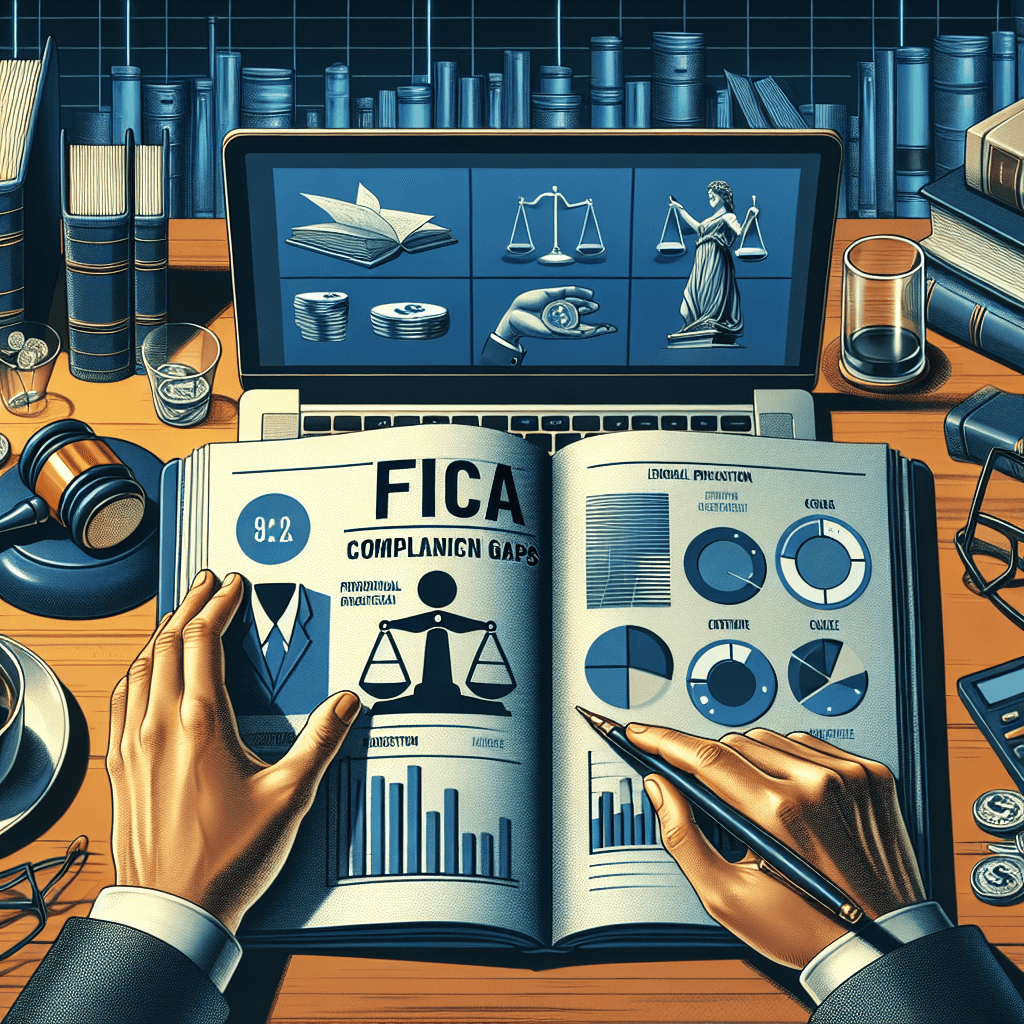Analyzing Fica Compliance Gaps For Legal Practitioners

Click to view full size
Analyzing FICA Compliance Gaps for Legal Practitioners
As legal practitioners, understanding and mastering compliance with the Financial Institutions Reform, Recovery, and Enforcement Act (FIRREA) and its associated regulations, collectively referred to as FICA (Foreign Corrupt Practices Act), is crucial for safeguarding your practice against legal pitfalls. In this article, I will analyze common FICA compliance gaps, helping you navigate the complexities and ensuring your adherence to vital regulations.
Understanding FICA Compliance
FICA encompasses various regulations designed to prevent financial crimes, including money laundering and fraud. Legal professionals must ensure that they have robust compliance programs in place to avoid penalties, which can be severe. Knowing what areas are often overlooked can help mitigate the risk of falling short of compliance standards.
Key Components of FICA Compliance
Understanding FICA compliance involves several critical components:
- Enhanced Due Diligence: Conducting thorough background checks and risk assessments on clients and their transactions.
- Reporting Obligations: Ensuring timely reporting of suspicious activities to the authorities.
- Comprehensive Training: Regularly training staff on compliance policies and legal updates.
Failure to address any of these components can lead to compliance gaps, exposing your firm to potential liabilities.
Common Compliance Gaps
Despite the importance of FICA compliance, many legal firms encounter gaps in their adherence. Here are some prevalent issues:
Insufficient Client Vetting
- Not conducting rigorous background checks can result in inadvertently working with clients involved in illicit activities. Utilize databases like the Office of Foreign Assets Control (OFAC) to screen clients.
Neglecting Training Programs
- Inadequate or infrequent training for attorneys and staff can create a lack of awareness about compliance obligations. Regular workshops and updating training material can enhance compliance knowledge.
Poor Recordkeeping
- Failing to maintain accurate and organized records of client transactions can lead to complications during audits. Implementing document management systems can automate this process.
Inconsistent Monitoring of Transactions
- Many firms neglect to monitor transactions consistently post-initial evaluation. Establishing ongoing monitoring procedures can help identify suspicious activities promptly.
Weak Reporting Mechanisms
- Lacking clear protocols for reporting suspicious activities can lead to delays or missed opportunities. Developing a standardized reporting procedure ensures timely compliance.
Implementing Effective Compliance Strategies
To close the FICA compliance gaps identified, I suggest the following strategies:
Conduct Regular Compliance Audits
- Schedule periodic reviews of your compliance program to identify weaknesses and areas for improvement.
Develop a Culture of Compliance
- Foster an environment where compliance is valued. Encourage open communication about compliance challenges and successes within your team.
Leverage Technology
- Invest in compliance technology solutions that assist with client screening, transaction monitoring, and data analytics.
Engage Expert Consultants
- If internal resources are lacking, consider hiring external compliance consultants who specialize in legal FICA compliance to assess your firm's practices.
Conclusion
Analyzing FICA compliance gaps for legal practitioners is essential to maintaining a trustworthy and resilient practice. By focusing on areas such as client vetting, training, recordkeeping, transaction monitoring, and reporting mechanisms, you can enhance your firm’s compliance posture. Regular audits, fostering a culture of compliance, employing technology, and potentially enlisting expert consultants can proactively close these gaps.
About my experience: Over the years, I have witnessed firsthand the repercussions of inadequate compliance measures within the legal field. By implementing these insights and strategies, I have successfully fortified my practice against vulnerabilities and positioned it for sustained legal integrity.
For further information on FICA regulations, I recommend visiting the Financial Crimes Enforcement Network (FinCEN) and the U.S. Department of Justice (DOJ) websites, where comprehensive resources and guidelines are available.
By prioritizing FICA compliance in your legal practice, you not only secure your firm’s reputation but also contribute to the overarching goal of combating financial crime. Let's work together to ensure our practices are not just legally sound, but also ethically responsible.
Related Articles
- Fica Compliance Requirements For Independent Financial Advisors In South Africa
- Kyc Procedures For Financial Service Providers In South Africa
- Fica Compliance Guidelines For Legal Practitioners
- Understanding Fica Obligations For Motor Vehicle Dealerships
- Kyc Solutions For Highvalue Goods Retailers
- Fica Compliance Checklist For Property Practitioners
- How To Achieve Fica Compliance For South African Businesses
- Kyc Best Practices For Estate Agents In South Africa
- Fica Compliance Training For Financial Advisors In South Africa
- Fica Compliance For Real Estate Professionals In South Africa
- Role Of Kyc In Fica Compliance For Financial Service Providers
- Fica Compliance Audits For Legal Firms In South Africa
- Fica Compliance Strategies For Car Dealers
- Implementing Kyc Measures In Highvalue Goods Transactions
- Fica Compliance Documents Required For Estate Agents
- Effective Kyc Policies For South African Businesses
- Fica Compliance Software Solutions For Financial Advisors
- Understanding The Fica Compliance Framework For Motor Vehicle Dealers
- Kyc Challenges Faced By Property Practitioners In South Africa
- Fica Compliance Resources For Independent Financial Advisors
- How To Streamline Fica Compliance For Legal Practitioners
- Importance Of Kyc In Fica Compliance For Fsps
- Fica Compliance Workshops For Motor Vehicle Dealerships
- Best Kyc Practices For Highvalue Goods Dealers
- Fica Compliance Consulting Services For Estate Agents
- Enhancing Fica Compliance In South African Real Estate
- Kyc And Fica Compliance For Small Business Owners In South Africa
- Fica Compliance Requirements For Luxury Car Dealerships
- Comprehensive Kyc Solutions For Property Professionals
- Managing Fica Compliance Risks For Financial Service Providers
- Fica Compliance For Legal Practitioners In The Digital Age
- How To Conduct Kyc In Highticket Sales Transactions
- Fica Compliance Tips For Independent Financial Advisors
- Evaluating Fica Compliance Processes For South African Businesses
- Kyc Verification Methods For Estate Agents
- Fica Compliance Notifications And Updates For Car Dealers
- Best Practices For Fica Compliance In The South African Retail Industry
- Kyc Technology Solutions For Financial Services Firms